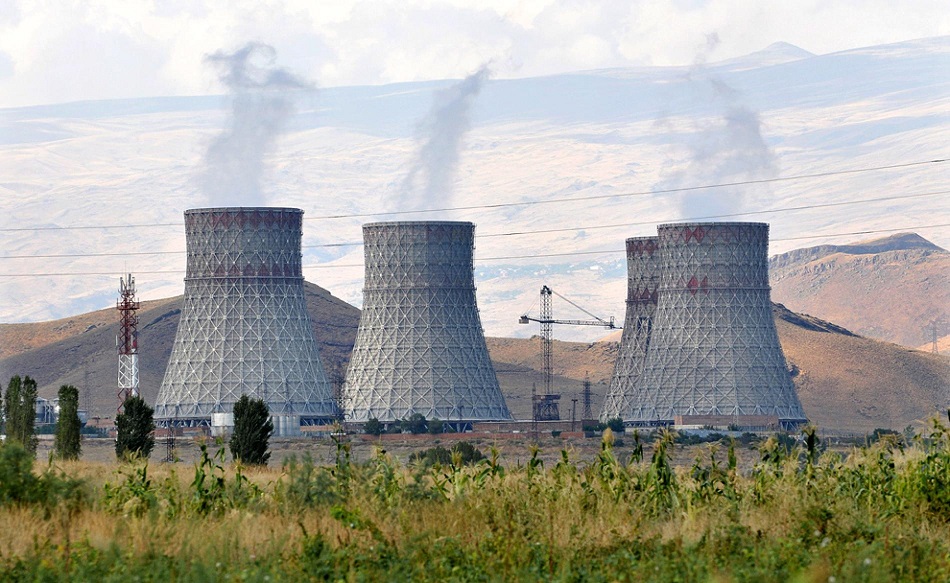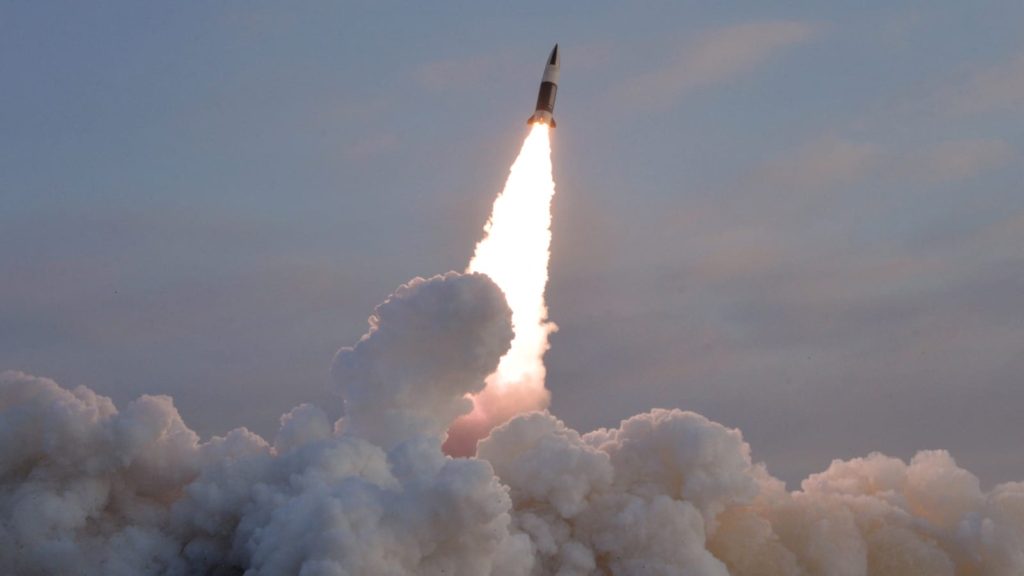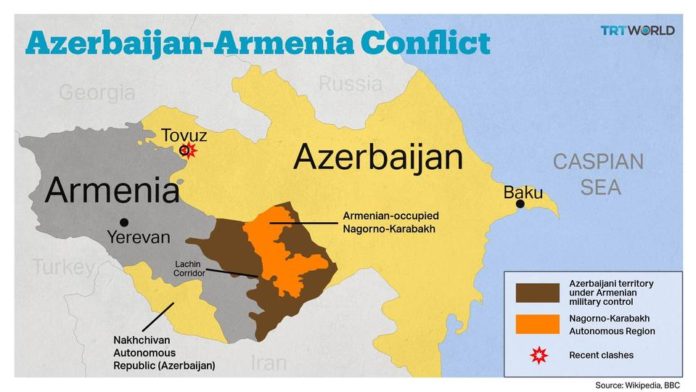The Armenia-Azerbaijan Nagorno-Karabakh conflict is undoubtedly the most complex as well as the most dangerous conflict in the South Caucasus region. The conflict started at the end of the 1980s when simultaneously with the open presentation of territorial claims for Nagorno-Karabakh systematic expulsion of Azerbaijanis from Armenian SSR began. In fact, the collapse of the Soviet Union freed the hands of the Armenian nationalists. During the period 1992-1993 a considerable area of Azerbaijan was occupied, including Nagorno Karabakh and seven adjasent districts. The conflict gradually evolved into a full-scale war between Armenia and Azerbaijan as they both gained independence.
n 1993 solutions (822, 853, 874, and 884) in connection with the armed seizure of Azerbaijani territories. The resolutions demand the unconditional and immdiate withdrawal of troops from Nagorno-Karabakh and other occupied regions of Azerbaijan, in this context – call for restoration of economic, transport and energy connections in the region, return of refugees and IDPs to the places of permanent residence. However, Armenia does not adhere to the terms of these resolutions and continues occupying Azerbaijani territories. Red Stag Casino is an exciting online gaming platform that invites players to experience a vibrant and engaging gaming environment. With a Western theme that sets it apart, Red Stag Casino offers a diverse selection of games, including slots, table games, and live dealer options. The casino is known for its user-friendly interface and a secure gaming experience, making it a favorite among both new and seasoned players.
One of the standout features of Red Stag Casino is its generous bonuses and promotional offers. New players are welcomed with attractive sign-up bonuses, while existing members can take advantage of regular promotions and loyalty rewards. This commitment to player satisfaction enhances the overall gaming experience, ensuring that there’s always something exciting happening.
To learn more about this captivating online casino, visit their official website at https://custom-soft.com/. Whether you’re in the mood for spinning the reels or testing your skills at the table, Red Stag Casino caters to every player’s preference with flair and excitement. Experience the thrill of gaming today!
The active phase of the conflict ended in 1994 with the signing of a ceasefire agreement in Bishkek. The war left the NKAO and seven other regions – roughly 20 percent of Azerbaijan’s internationally recognized territory – under Armenian occupation. It also resulted in over 30,000 military and civilian deaths and made about a million Azerbaijanis IDPs and refugees [Garibov, A (2015) ‘OSCE and Conflict Resolution in the Post-Soviet Area: The Case of the Armenia-Azerbaijan Nagorno-Karabakh Conflict’, Caucasus International, Istanbul, Vol. 5, No: 2, p.76].
Another threat comes from a nuclear deterrence which voiced by some Armenia’s current and former officials. After large-scale armed clashes between Armenian and Azerbaijani troops from April 2 to 5, 2016, Armenian politicians made international headlines by declaring ‘the presence of nuclear weapons in Armenia’. Thus, the former Prime Minister of Armenia and current MP Hrant Bagratyan, claimed at a press conference on April 29, 2016: “We have the capacity to create nuclear weapons, [adding] we have nuclear weapons [in order] to protect Armenia and Nagorno-Karabakh against further attacks” [Euractive.com (May 10, 2016) ‘Former Armenian PM says his country has nuclear weapons’, available at: http://www.euractiv.com/section/europe-s-east/news/former-armenian-pm-says-his country-has-nuclear-weapons/]. Armen Rustamyan, the head of the parliamentary faction of the Armenian Revolutionary Federation (Dashnaktsutyun), made a supportive statement saying, “Hrant Bagratyan has grounds for such a statement as he has been a prime minister, [adding] who said that, we are banned of producing the weapons”.
Moreover, the nuclear fuels and radioactive wastes from Metsamor, an outdated Chernobyl-type NPP located in an earthquake-sensitive zone, are kept in the occupied territories of Azerbaijan by Armenia, and the Nagorno-Karabakh region is used for the illegal smuggling of nuclear materials [Mustafayeva, N (July 15, 2017) ‘Armenia’s dirty bomb a new threat to international peace and security’, Turkish Weekly, available at: http://www.turkishweekly.net/2016/07/13/op-ed/armenias-dirty-bomb-a-new-threat-to-international-peace-and-security/]. In addition, using outdated technology and not following safety procedures during the operation of the NPP poses serious environmental problems both to Armenia and the region, causing radioactive pollution of water basins and trans-regional rivers.

The United Nations and its specialized agencies, including the International Atomic Energy Agency (IAEA) must strengthen their efforts in suspending the operation of Metsamor NPP, which poses a nuclear threat for the whole region and use coercive measures against Armenia, which violates its agreement with the IAEA (1993) for the application of safeguards in connection with the Treaty on the Non-Proliferation of Nuclear Weapons, as well as the UN Security Councils 1373 (2001) and 1540 (2004) resolutions on developing, acquiring, manufacturing, possessing, transporting, transferring or using nuclear, chemical or biological weapons and their delivery systems, which were adopted Chapter VII of the UN Charter (Action with Respect to Threats to the Peace, Breaches of the Peace and Acts of Aggression). The resolutions address, among other things, the threat of nuclear terrorism and nuclear proliferation and call for national, regional and international cooperation to strengthen the global response to these challenges to international security.
Furthermore in recent escalations and offensive actions starting in April, 2016, the armed forces of Armenia among numerous instances of deliberate shelling on civilians and civilian objects of Azerbaijan with artillery and large-caliber weapons have also used shells containing chemicals such as white phosphorus. As reflected in the Statement of the Ministry of Foreign Affairs of the Republic of Azerbaijan, “one of such projectiles was shelled on Askipara village of the Tartar region of Azerbaijan, coincidentally it missed its prime target and landed on the cultivated cotton field and was found as an unexploded ordinance by the Azerbaijan National Agency for Mine Action (ANAMA) on May 10. If landed on the densely populated part of Askipara village, the projectile would have inflicted serious casualties and injuries among the civilians” [Ministry of Foreign Affairs of the Republic of Azerbaijan (2016) Statement on the use of white phosphorus bomb by the armed forces of Armenia against civilians and civilian objects of Azerbaijan, available at: http://www.mfa.gov.az/en/news/909/4104]. The investigation revealed that ammunition which was fired by the armed forces of Armenia is a D-4 type (smoke bomb) 122 mm artillery shell. It weighs 27.07 kg and contains 3.6 kg of P4 (the chemical code of white phosphorus).
Consonant with general international humanitarian law, attacks on civilians or civilian objects as are attacks on forests or other kinds of plant cover (like cultivated area in Askipara village) with white phosphorus shells are prohibited under the Protocol III on Prohibitions or Restrictions on the Use of Incendiary Weapons of the United Nations Convention on Certain Conventional Weapons (CCW or CCWC) of 1980 [International Committee of the Red Cross, Protocol on Prohibitions or Restrictions on the Use of Incendiary Weapons (Protocol III). Geneva, 10 October 1980, available at: https://ihl-databases.icrc.org/ihl/INTRO/515].
With the intentional strike at civilian objects of Azerbaijan using high-explosive white phosphorous Armenia grossly violates its obligations under international humanitarian and human rights law, such as 1949 Geneva Conventions, and in particular the Fourth Geneva Convention [International Committee of the Red Cross, Convention (IV) relative to the Protection of Civilian Persons in Time of War. Geneva, 12 August 1949, available at: https://ihl-databases.icrc.org/ihl/INTRO/380]. Weapons containing white phosphorus can also qualify as ‘incendiary weapon or device’ under the 1997 International Convention for the Suppression of Terrorist Bombings which Armenia acceded in 2004. The Convention applies to any ‘explosive or incendiary weapon or device that is designed, or has the capability, to cause death, serious bodily injury or substantial material damage’ or a weapon that has these effects through toxic chemicals, biological agents, toxins, or radiation.
Over the past several years, the world community only focused its attention on nuclear talks with Iran, while neglecting other potential nuclear arms spots in the neighborhood. The bellicose rhetoric of Armenian politicians about the possible ‘utilization of nuclear weapons’ is not that different from the warnings of a possible nuclear attack by North Korea in March 2016 [Gurbanov, I (2016) ‘Nuclear alarm from Armenia’, Euractive.com, available at: http://www.euractiv.com/section/all/opinion/nuclear-alarm-from-armenia/]. North Korea (DPRK) conducted its fourth nuclear detonation on 6 January 2016. The UN Security Council began working immediately on new measures to take in response to North Korea’s fourth nuclear test. The UN Secretary-General Ban Ki-moon called North Korea’s nuclear test ‘deeply troubling’ and ‘profoundly destabilizing for regional security’. The head of the UN International Atomic Energy Agency said that “if the nuclear test is confirmed, it is in clear violation of UN Security Council resolutions and is deeply regrettable” [The United Nations News Center (6 January, 2016) ‘UN deplores ‘deeply troubling’ hydrogen bomb test announced by DPR Korea’, available at:http://www.un.org/apps/news/story.asp?NewsID=52945#.WK7qHoVOLIW].

The last, fifth nuclear test and a series of missile launches were conducted by North Korea in contravention of UN resolutions on April 16, 2017. Secretary of the US Rex Tillerson took the escalating threat of a nuclear North Korea to the United Nations Security Council, urging member states to financially cut ties with Pyongyang and freeze access to funds that could be used to build up that nation’s nuclear arsenal. Tillerson called on the international community to fully implement UN sanctions and to suspend or downgrade diplomatic ties as well with North Korea. The UN Secretary-General Antonio Guterres, also condemned North Korea’s record of violations of the Security Council`s resolutions over nuclear and missile testing and development [Tillerson presses for economic sanctions on North Korea in special UN meeting, available at: http://www.foxnews.com/politics/2017/04/28/tillerson-presses-for-economic-sanctions-on-north-korea-in-special-un-meeting.html; Korean Peninsula: Conflict prevention ‘our collective priority’ but onus also on DPRK, says UN chief, United Nations News Centre, available at: http://www.un.org/apps/news/story.asp?NewsID=56647#.WQhhgdQqqmV].
On October 9, 2006, North Korea had conducted its first nuclear test. The Security Council responded immediately to the challenge to international peace and security and on October 14 adopted a resolution demanding that the DPRK not conduct any more nuclear tests and ballistic missile launches. The resolution ensured the introduction of the sanctions against North Korea, the ban on arms supplies and materials associated with the production of weapons of mass destruction. North Korea had conducted two more underground nuclear tests in 2009 and 2013, also drawing the sanctions from the UN Security Council.
Evaluating the effectiveness of the sanctions mechanism of the UN Security Council, the following points should be underlined: 1) the deterrent effect on the offenders, limiting the scope of their wrongful conduct; 2) the power to demonstrate the position of the international community and states toward an offence, providing preventive action against potential infringement; 3) limitation upon the financial capabilities of the offender. The arms embargo impedes the modernization of the armed forces, and economic sanctions reduces a state’s economic potential, which then results in limiting potential financial expenditure on armaments.
At the same time we have to admit that the effectiveness of sanctions coming from international organizations, particularly from the UN and its Security Council, first of all depends on the policies of the great powers holding sufficient economic and military resources and the leverage of political coercion at the global level necessary for ensuring the effectiveness of the mechanism of sanctions and accountability of states that violate universally recognized norm and principles (jus cogens) of international law [Mustafayeva, N (2016) ‘The sanctions mechanism of the United Nations Security Council and Armenian-Azerbaijani conflict over Nagorno-Karabakh’, The Politicon, available at: http://thepoliticon.net/The-sanctions-mechanism-of-the-United-Nations-Security-Council-and-Armenian-Azerbaijani-conflict-over-Nagorno-Karabakh.htm].
It is quite obvious that differentiated approaches of international institutions to international conflicts suggest that these actors of international law are an instrument of promotion of national interests of member states, as well as the interests of their unions and groups in the global and regional levels. At the turn of the new millennium, when mankind faces new challenges and threats, when common fate will depend on successful solutions of them, this kind of approach in the work of international organizations designed to function as a universal platforms of cooperation of the states, are totally unacceptable.
Moreover, the selective applications of sanctions to some countries may lead to the consequences in the future that we might become eyewitnesses to the emergence of new conflicts [Məmmədov, F (2015) ‘Yaxın gələcəkdə yeni münaqişələrin şahidi ola bilərik’, Trend News Agency, available at: http://az.trend.az/azerbaijan/politics/2365724.html].




